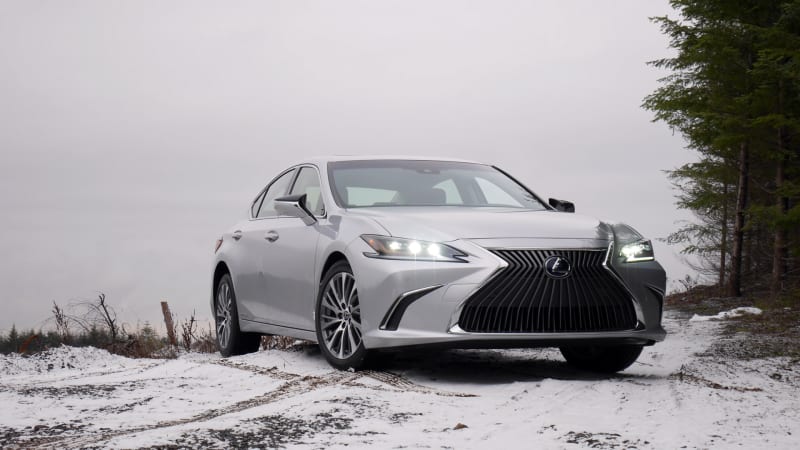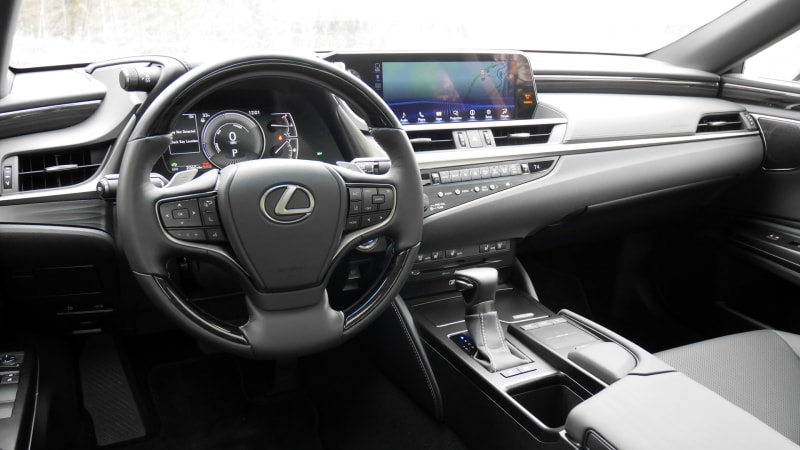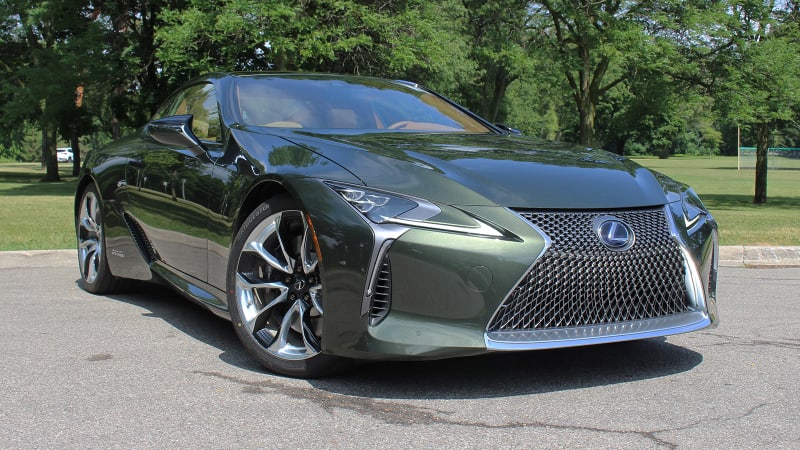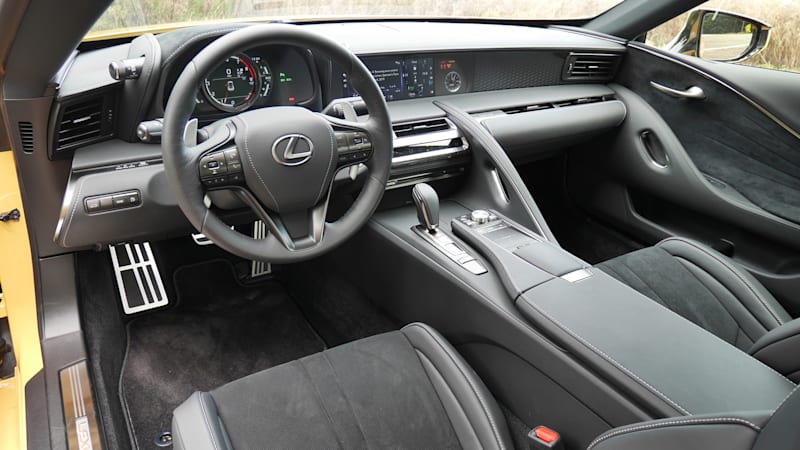9 best hybrid cars of 2022 and 2023
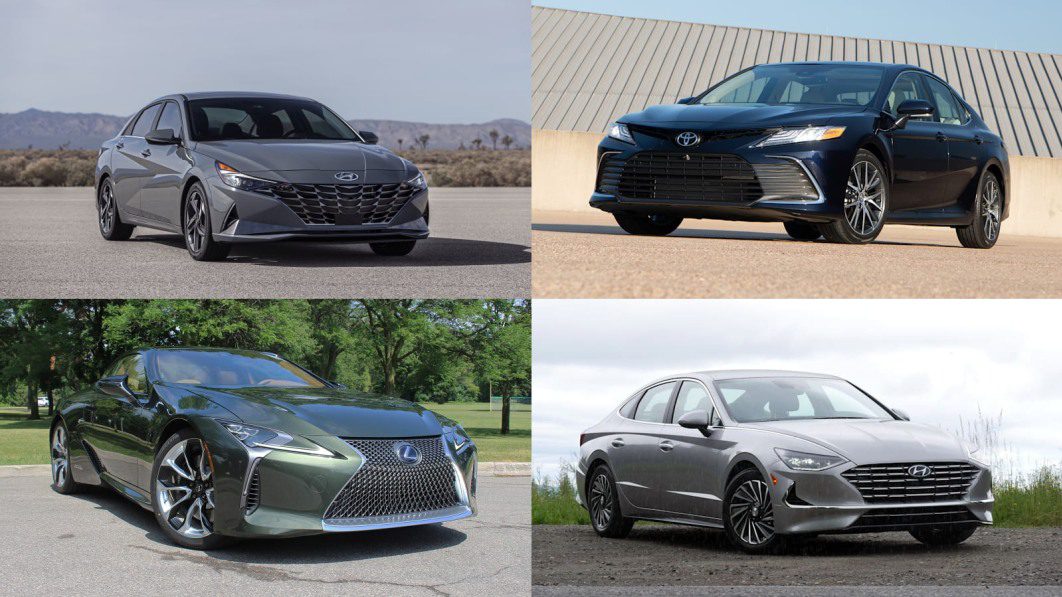
With the auto industry pivoting toward complete electrification, it shouldn’t be surprising that the development of new hybrid cars has basically screeched to a halt. Toyota/Lexus makes the bulk of them, while additionally only Honda, Hyundai and Kia offer them at all. Hybrid cars — specifically sedans and hatchbacks — are an endangered species as SUVs continue to take over, including as hybrids.
And to be clear, we specifically mean “hybrid” in the traditional gasoline-electric sense where the car recharges its batteries with its engine and by recouping energy from coasting and braking. The gasoline engine and electric motor(s) then pair in some arrangement to power the car together, hence the term “hybrid.” You don’t need to plug it in, and it doesn’t offer an appreciable amount of electric-only range. That’s what differentiates them from plug-in hybrids, which are being introduced in increasing numbers these days. Hybrids are also not to be confused with the growing number of “mild hybrids” that may enhance acceleration a tiny bit with an electric motor. Mild hybrids’ efficiency improvements are also far less.
Read more: Best electric cars and SUVs for 2022 and 2023
Read more: Cheapest electric cars of 2022
Yeah, so it’s a bit confusing, but while overlooked, traditional hybrids are still an excellent way of saving gas — be it for economic or environmental reasons. They’re increasingly even the most compelling versions of their respective model lineups, which wasn’t true in the past.
Best Small Hybrid Cars | Best Midsize Hybrid Cars | Best Luxury Hybrid Cars
Best small hybrid cars
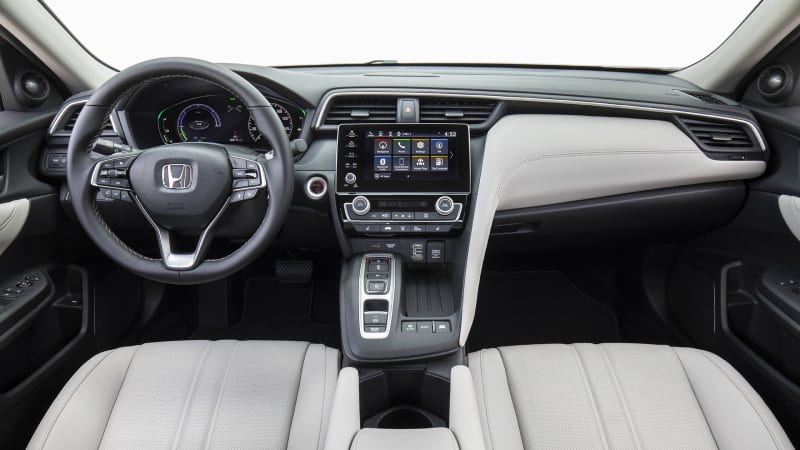
Honda Insight
Pros: High-quality cabin; handsome looks; electric-like power delivery
Cons: It’s been cancelled for 2023; antiquated tech interface
EPA-estimated fuel economy: 52 mpg combined (EX) and 48 mpg combined (Touring)
Read our Honda Insight Review
The Honda Insight is our top choice for a small hybrid car, which makes it even more sad that Honda is discontinuing it for 2023 (though it’s possible it could be replaced). So, if this sounds like your type of hybrid (and it probably should), we’d suggest acting quickly before they all disappear. And really, you might’ve not realized the Insight was a hybrid in the first place. Its conventional compact sedan body shape and general lack of weirdness stand in sharp contrast to the hybrid expectations established by the Toyota Prius. At the same time, the Insight effectively gets the same fuel economy as Toyota’s definitive hybrid, but betters it substantially in terms of interior quality and design, overall comfort and noise, and driving response. And quite honestly, it’s not as ugly. Quite the opposite, actually. Basically, the Insight is just a better car than the Prius. Hopefully Honda does in fact come out with a replacement.
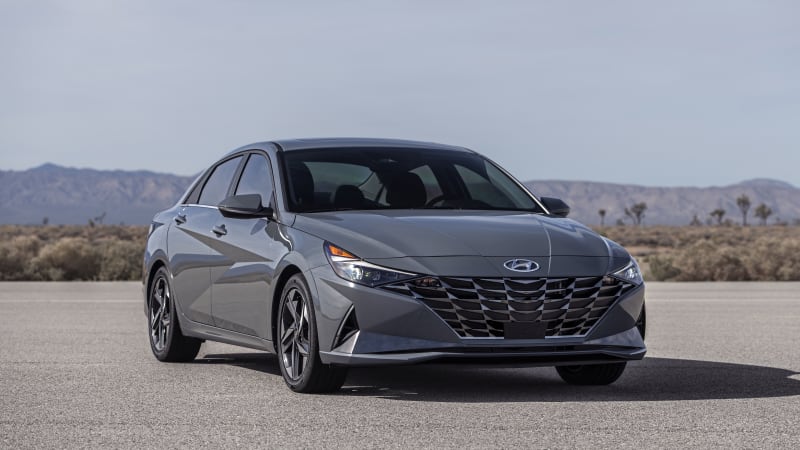

Hyundai Elantra Hybrid
Pros: There aren’t many compact hybrids left, and it’s the best one; normal driving experience; spacious interior
Cons: Styling may be a bit overboard.
EPA-estimated fuel economy: 50 mpg combined and 54 mpg combined (Blue trim)
Read our Hyundai Elantra Hybrid Review
Now that the Honda Insight will be no more, the 2023 Elantra Hybrid has become your best bet among compact hybrid sedans. It has also effectively replaced Hyundai’s greatly underappreciated Ioniq Hybrid. Beyond getting exceptional fuel economy of 50 or 54 mpg combined, depending on trim level, the Elantra Hybrid stands out by being awfully normal to drive. There’s no droning electronically controlled CVT mooing as with Toyota system and the engine doesn’t rev even if your foot isn’t on the accelerator like Honda’s. The reason is Hyundai uses a traditional six-speed automatic transmission for its hybrid system. The Elantra also stands out because, well, just look at the thing. It’s awfully wild with all those sharp creases everywhere, dominant grille and pointy rear end. The interior, meanwhile, is more conventional by hybrid standards (for the better), featuring a look that is modern and sporty. Its infotainment and safety technology are also top notch.


Toyota Prius
Pros: Available all-wheel-drive; it’s synonymous with hybrids; one of the few compact hybrids left; versatile cargo space
Cons: Loud; weird interior design; dated technology; ugly styling
EPA-estimated fuel economy: 52 mpg combined or 56 mpg combined (Eco trim level)
NOTE: Information about the 2023 Toyota Prius was not available at the time of this writing
We left the Prius off this list last year. Quite simply, the Honda Insight and Hyundai Ioniq were better cars. Both will soon be dead, which means by default, the Prius moves back up to the podium. It remains a flawed choice due to its bizarre interior with aged tech and meh quality, ample interior noise, detached driving experience (even for a hybrid), and ugly exterior styling that almost certainly has contributed to the Prius’ popularity plummeting with the most recent generation. Still, the Prius gets 52 mpg combined, which is the whole point of a hybrid, right? It also has a spacious, versatile interior, and although the driving experience may certainly be devoid of any feedback let alone enjoyment, at least it’s easy to drive. You can also get it with all-wheel drive, which is unique among hybrid cars. So basically, this is a lukewarm recommendation. Look first at those choices above and below.
Best midsize hybrid cars
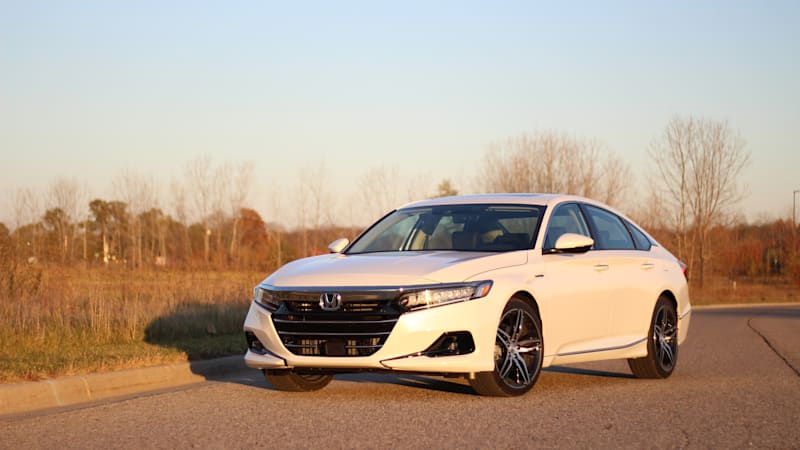

Honda Accord Hybrid
Pros: Class-leading back seat and trunk space; electric-like power delivery; best-in-class ride and handling
Cons: Iffy fuel economy in the otherwise desirable Sport and Touring trims
EPA-estimated fuel economy: 47 mpg combined or 43 mpg combined (Sport and Touring trim levels)
Read our Honda Accord Hybrid Review
NOTE: This applies to the 2022 Accord Hybrid. There will reportedly be a major refresh for ’23.
The Honda Accord is our top choice among midsize family sedans, and that doesn’t change when it comes to hybrid versions. In fact, the Hybrid is the Accord version we recommend first as its superior fuel economy and agreeable electric-like power delivery don’t come with substantial tradeoffs. Yes, it’s more expensive than a regular gas-only Accord, but like the other hybrid sedans here, the price premium is manageable given the gas savings. Like every Accord, though, the Hybrid stands out with a truly colossal amount of interior space (the trunk is just enormous), a well-made interior, and a driving experience that sets a just-right balance between ride comfort and handling response. And unlike other Hondas, including the Insight and CR-V Hybrid, the Accord has a newer, more user-friendly tech interface.
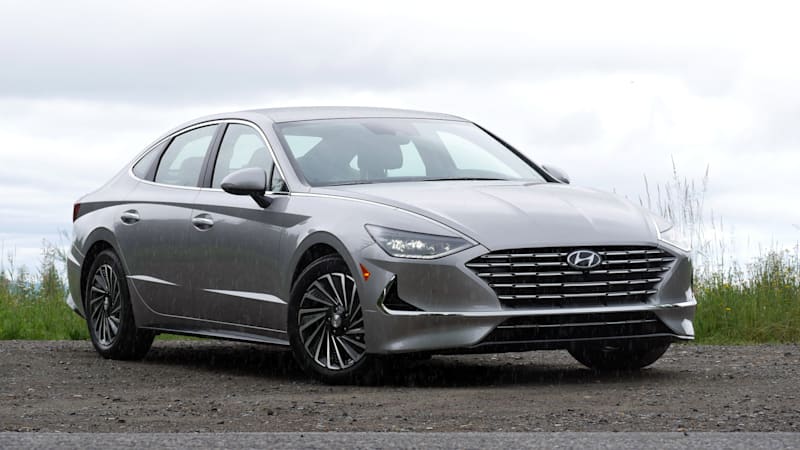
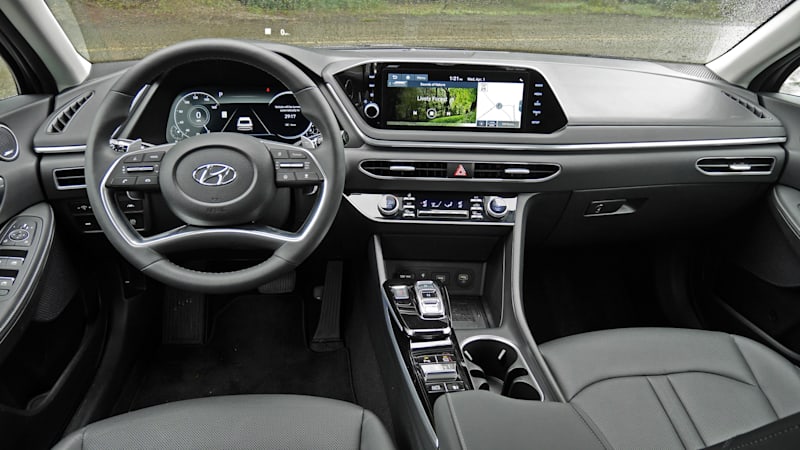
Hyundai Sonata Hybrid
Pros: Best-in-class infotainment and safety technology; bold style; drives “more normal”
Cons: OK, so maybe the styling’s too bold
EPA-estimated fuel economy: 47 mpg combined or 52 mpg combined (Blue trim level)
Read our Hyundai Sonata Hybrid Review
For all the many practical, space-related areas where the Accord Hybrid lead the segment, the Hyundai Sonata Hybrid is basically just a hair or two behind it. At the same time, its bold styling and classy interior help it stand out in non-practical ways — its design may not be for everyone, but Hyundai is always at its best when it’s pushing the envelope, and this latest Sonata is no different. Besides its design, the Sonata Hybrid is a clear standout in terms of infotainment and safety technology. Although the list of features between it and its competitors are similar, Hyundai’s execution and user-friendliness are superior. Many are also likely to prefer driving Hyundai’s hybrid powertrain. It uses a traditional six-speed automatic, meaning it drives “more normal” with stepped gear changes instead of the Camry’s e-CVT or the Accord’s unusual, too-complicated-to-describe-here setup.
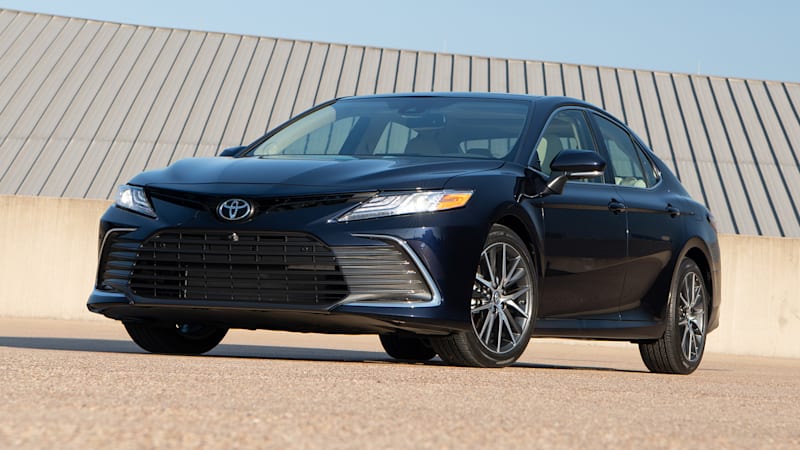

Toyota Camry Hybrid
Pros: Different “flavors” of Camry with more luxury- and sport-oriented models
Cons: Antiquated infotainment system; less refined power delivery
EPA-estimated fuel economy: 46 mpg combined or 52 mpg combined (LE trim level)
Read our Toyota Camry Hybrid Review
The Camry would definitely be our third choice in this group of midsize hybrids, but that’s because the Accord and Sonata do most things just a little better. The Camry Hybrid is still really good. Indeed, it’s the pick of the Camry litter. Its electric motor adds the low-end pull the base four-cylinder lacks, while also smoothing things out considerably. Furthermore, the battery’s placement under the back seat lowers the car’s center of gravity and lessens the front weight bias, making for improved dynamics around corners. A heavy right foot still results in a fair bit of droning from the powertrain, but it is better than past Toyota hybrid efforts, as is the brake-pedal modulation. That you can get it in the sportiest, more luxurious XSE along with a variety of luxury- and sport-oriented “flavors” is icing on the cake. Importantly, it can get the same fuel economy as the Prius while being a wildly more refined and just better car.
Best luxury hybrid cars
Lexus ES 300h
Pros: 44 mpg from a large luxury car is unheard of; surprisingly good to drive; impeccable interior quality
Cons: Annoying tech; slow for a luxury car; droning powertrain
EPA-estimated fuel economy: 44 mpg combined
Lexus is literally the only luxury car brand that sells conventional hybrids these days, so the fact that it sweeps the podium here should not be taken for anything greater than it is. Nevertheless, the ES 300h is a terrific luxury car choice for those prioritizing fuel economy. Not only does it provide 44 mpg combined, which is a sky-high number only plug-in hybrids could beat, it’s quite a large luxury car. Similarly priced sedans are almost all much smaller, meaning as a value play, the Lexus ES 300h makes a lot of sense. Lexus’ superior reliability and resale value reputations builds its case even further. The down side is that the ES suffers from frustrating infotainment controls and a powertrain that, while thrifty, is slow and a bit unrefined for a luxury car.
Lexus LC 500h
Pros: Just look at the thing; beautiful interior; exceptional fuel economy for a luxury GT
Cons: Hybrid power delivery can seem a bit weird in a car like this
EPA-Estimated Fuel Economy: 29 mpg combined
Even if every luxury car brand sold a hybrid, there’s a very good chance the LC 500h would still end up on this list. It’s a gorgeous luxury GT with an interior exquisite enough in design and quality to make up for the fact that its tech interface makes you want to pull your hair out. Although the regular LC 500’s 5.0-liter V8 will always hold a special place in our hearts, there’s no denying that the LC 500h and its 29 mpg combined is a far more responsible choice — especially for a car that’s comfortable and pleasant enough to legitimately drive on a daily basis or on long road trips. The hybrid powertrain is also impressive enough that it won our 2018 Technology of the Year award. This is as close as you can get to a guilt-free luxury GT.

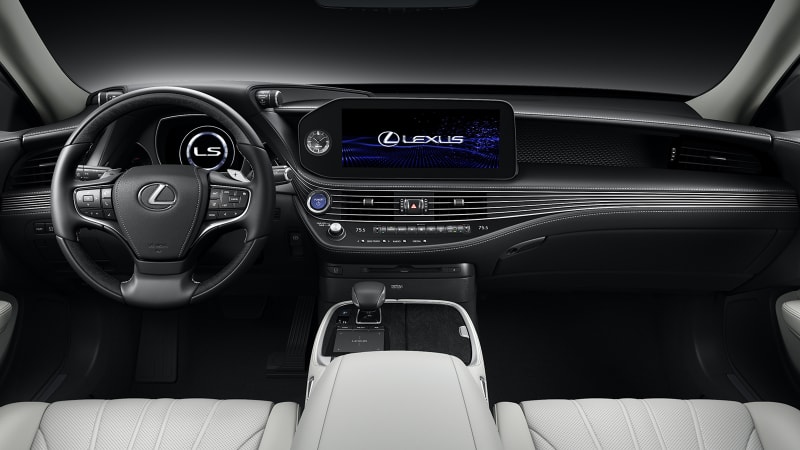
Lexus LS 500h
Pros: Distinctive and exquisitely made interior; more engaging to drive than you’d think; exceptional fuel economy
Cons: Less powerful than other flagship luxury sedans; less sophisticated infotainment
EPA-estimated fuel economy: 28 mpg combined (RWD) or 26 mpg combined (AWD)
Read our Lexus LS 500h Review
The Lexus LS long ago got a reputation as a dull-as-ditch-water luxury sedan, but that’s just not the case with the latest version. It actually has the same powertrain and shares its rear-wheel-drive platform with the LC 500h, and although it isn’t as sharp as that, this isn’t the Grandpa’s couch that previous LS generations were. We legitimately enjoy driving the LS more than most versions of the BMW 7 Series (imagine saying that 15 years ago!), and that includes the compelling LS 500h hybrid. This does make up for the fact that this hybrid Lexus’ fuel economy isn’t that much better than the gas-only BMW 740i, but that says more about BMW’s engineering wizardry, as no other flagship luxury sedan comes close to either. You’ll also be dealing with Lexus reliability, and although the brand’s design isn’t always for everyone, the LS generally appears more athletic than its more conservative, stately rivals. Its “Signature Spindle Grille” even seems subtle compared to the faces of the flagship BMW, Audi and Genesis sedans.
Related video:
